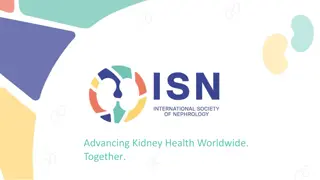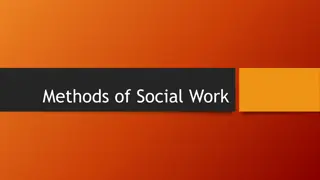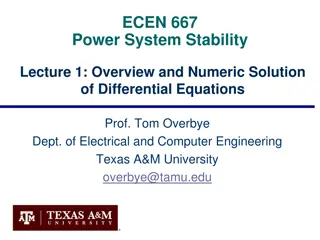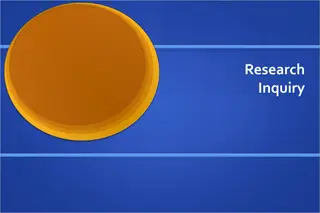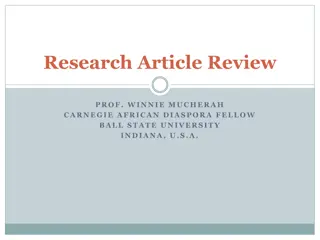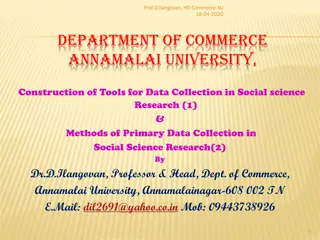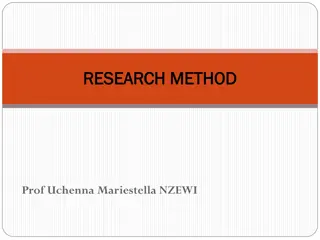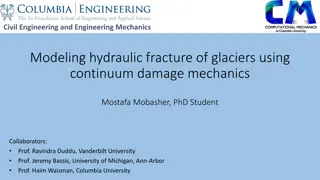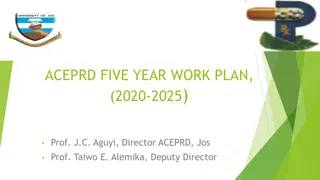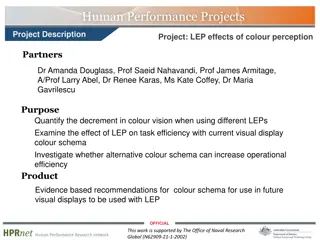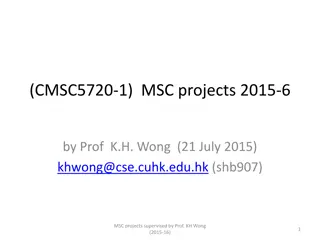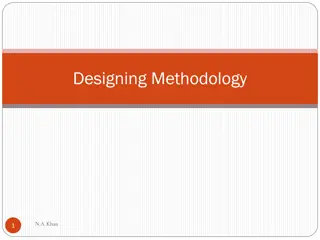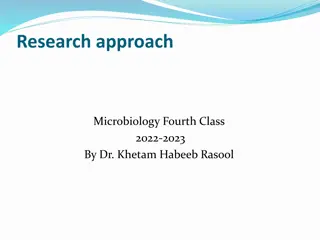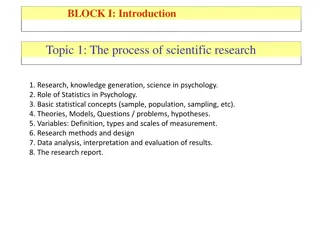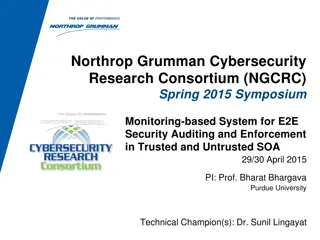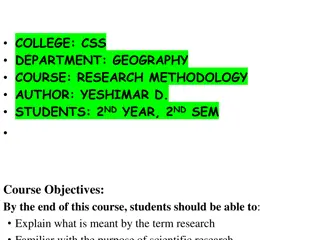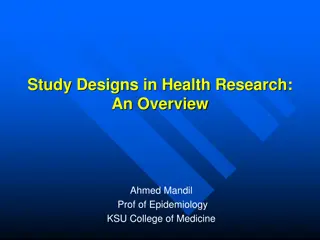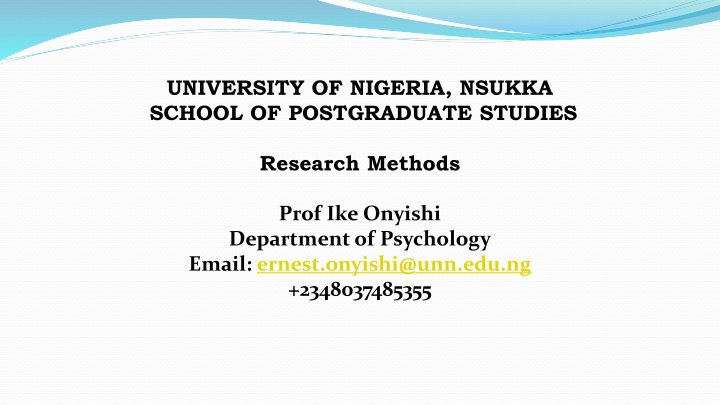
Mastering Research Methods for Postgraduate Studies
Enhance your research skills with a workshop focusing on critical imagination, theoretical frameworks, research questions, methods, and data analysis. Learn to develop a researchable topic, formulate good questions, understand various methods, and explain data analysis processes under Prof. Ike Onyishi's guidance at the University of Nigeria, Nsukka.
Download Presentation

Please find below an Image/Link to download the presentation.
The content on the website is provided AS IS for your information and personal use only. It may not be sold, licensed, or shared on other websites without obtaining consent from the author. If you encounter any issues during the download, it is possible that the publisher has removed the file from their server.
You are allowed to download the files provided on this website for personal or commercial use, subject to the condition that they are used lawfully. All files are the property of their respective owners.
The content on the website is provided AS IS for your information and personal use only. It may not be sold, licensed, or shared on other websites without obtaining consent from the author.
E N D
Presentation Transcript
UNIVERSITY OF NIGERIA, NSUKKA SCHOOL OF POSTGRADUATE STUDIES Research Methods Prof Ike Onyishi Department of Psychology Email: ernest.onyishi@unn.edu.ng +2348037485355
OUTLINE Making Decisions about our research Critical Imagination The Research Process Developing a theoretical framework/model Research Questions and Hypotheses Research Methods Data Analysis
GOALS AND OBJECTIVES At the end of the workshop participants would be able to: Develop a researchable project topic Develop good research question Describe the various research methods Explain data analytical procedures
INTRODUCTION Conducting research is a major aspect of postgraduate training. Most of us if not all would be required to conduct and submit a research project in the course of completing a postgraduate programme Thus, the need for adequate training on research methods
Making decisions about your research What should I research? Why? How to conduct the research Where?
The dilemma of the chicken and egg Going with a topic or going with a problem? The Method of Problems Versus the Method of Topics (Eidlin, 2010)
Important questions to reflect on as you develop your research projects How does your research advance ongoing debate in the field? What will a researcher/reader learn from the research that she/he does not know before? Why is the knowledge important? What positive impact does the research propose? If the research is completed what will it be cited for in the future?
Importance of critical imagination Critical imagination is a deliberate systematic decision making about research. It requires: A need for careful design Understanding of the nature of science/research Overcoming some common challenges to critical imagination
The Nature of Scientific Research (SR) SR is based on the systematic practice of disbelief Maintaining a sceptical attitude SR involves questioning stated and unstated assumptions SR helps in pushing the boundaries of knowledge Good SR discoveries are concerned with unintended consequences of human actions
Challenges to critical imagination Common sense- untutored knowledge of the social world (Hirschman, 1981) Where lies the novelty? An author is little to be valued who tells us nothing but what we can learn from every coffee house conversation (Charles Hume 1985) Trained incapacity*: specialisation that promotes ignorance
The Research/Project Development Process in theory Defining Research Questions Findings and Discussions Conclusion and Write- up Choosing a Topic Literature Review Collecting Data Data Analysis 11
a messy process in practice Choosing a topic Defining Implications Analysis Research Questions Literature Review Collecting data Conclusion Finished 12
Developing a theoretical framework/model Theory Defined A theory is a statement of relations among concepts within a set of boundary assumptions and constraints (Bacharach, 1989, p. 496) A theoretical framework represents your beliefs on how certain phenomena (variables or concepts) are related to each other (a model) and an explanation of why you believe that these variables are associated with each other (a theory) (Sekaran & Bougie, 2013, p. 68)
VARIABLES (Sekaran & Bougie, 2013) A variable is anything that can take on differing or varying values. Independent variable (IV): The variable that influences the dependent variable (DV) in either a positive or negative way. To conclude that the IV causes a change in the DV: The IV and DV should covary. The IV (the presumed causal factor) should precede the dependent variable. No other factor should be a possible cause of the DV. (The researcher should control for the effects of other variables). A logical explanation (theory) is needed and it must explain why the IV affects the DV.
VARIABLES (Sekaran & Bougie, 2013) A moderating variable (ModV) is one that has a strong contingent effect on the IV-DV relationship. A mediating variable (MedV) (or intervening variable) is one that surfaces between the time the IVs start operating to influence the DV and the time their impact is felt on it.
Job Crafting OCB Work- Family Conflict Work Engageme nt Rumination Psychological Capital Hypothesized model of the relationship between work engagement and work-family conflict (Onyishi, Nohe, Ugwu, Amazue, & Hertel, 2019)
Research Questions and Hypotheses Question: A research question is a question what I want to answer. Research question is a simple statement of research problem or puzzle or a gap Hypothesis: A hypothesis is a potential answer - a statement that can be proved or disproved. A hypothesis is an educated guess regarding what should happen in a particular situation under certain conditions.
Considerations for selecting a research question Researchers' interest/competence Is it researchable? (Literature) Importance, urgency and social relevance Novelty originality Feasibility (data, method, time , facilities, etc.)
Good hypotheses should Have clear concepts/constructs Show relationships (is the direction of relationship clear?) Directly refer to what is being studied Be clear on whether the focus is on causality or description. Is composed of an independent variable (cause) and a dependent variable (effect) BUT DO WE NEED RESEARCH QUESTIONS/HYPOTHESES FOR ALL RESEARCH PROJECTS?
Research Methods Basic versus Applied research Quantitative or Qualitative Research Experimental versus Non-experimental Cross-sectional versus Longitudinal
Research Methods Grounded theory Survey Archival Research Action research Comparati ve case study Ethnograph y Applied Quantitativ e Multimethods Social Network Analysis Phenomenolo gy Process tracing Experiment and quasi- experimental design 21
Research methods Multiple methods Single method Multi- quantitative Multi- qualitative Mixed methods 22
Typical analytical approaches in Quantitative and Qualitative methods Quantitative analysis: Statistical analysis/ models [descriptive statistics and inferential statistics) Qualitative: Case analysis, thematic, cluster, patterns, mapping, process tracing, etc. 23
An Acemoglu et al (2001) example of a mixed methods design: Basic idea: Economic performance Vs Qualityof Institutions Economic performanc e Qualityof institutio ns 24
Problem: Bi-directional Relationship Solution: Factor in to the analysis Process tracing (archival research) Early (Potential) settler mortality Settleme nt institution s Current Economic performance Current institutions 25
WHAT I HAVE LEARNT FROM THE WORKSHOP Want to share?

